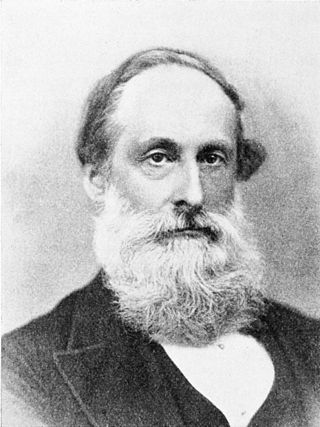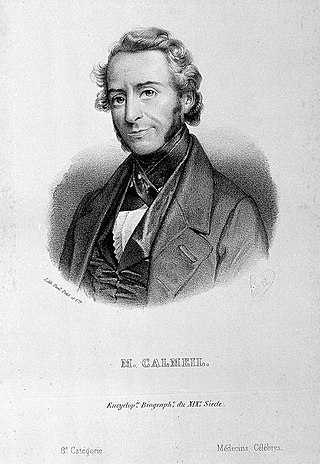Related Research Articles

1801 (MDCCCI) was a common year starting on Thursday of the Gregorian calendar and a common year starting on Tuesday of the Julian calendar, the 1801st year of the Common Era (CE) and Anno Domini (AD) designations, the 801st year of the 2nd millennium, the 1st year of the 19th century, and the 2nd year of the 1800s decade. As of the start of 1801, the Gregorian calendar was 12 days ahead of the Julian calendar, which remained in localized use until 1923.

Philippe Pinel was a French physician, precursor of psychiatry and incidentally a zoologist. He was instrumental in the development of a more humane psychological approach to the custody and care of psychiatric patients, referred to today as moral therapy. He worked for the abolition of the shackling of mental patients by chains and, more generally, for the humanisation of their treatment. He also made notable contributions to the classification of mental disorders and has been described by some as "the father of modern psychiatry".
The year 1825 science and technology involved some significant events, listed below.
The year 1826 in science and technology involved some significant events, listed below.
The year 1819 in science and technology involved some significant events, listed below.
The year 1816 in science and technology involved some significant events, listed below.
The year 1813 in science and technology involved some significant events, listed below.
The year 1811 in science and technology involved some significant events, listed below.
The year 1809 in science and technology involved some significant events, listed below.
The year 1776 in science and technology involved some significant events.
The year 1745 in science and technology involved some significant events.

The year 1801 in science and technology involved some significant events, listed below.

Daniel Hack Tuke was an English physician and expert on mental illness.
David Daniel Davis M.D. F.R.C.P. was a British physician.
Entomology, the study of insects, progressed between 1800 and 1850, with the publication of important texts, definition of new orders such as Aphaniptera and Strepsiptera, and the shift to specialization. The following timeline indicates significant events in entomology in this time period.

Louis-Florentin Calmeil was a French psychiatrist and medical historian born in Yversay.
Étienne-Jean Georget was a French psychiatrist. He is known for writing on monomania. He is also the pioneer of forensic psychiatry, and was the first psychiatrist to discuss the defence of insanity to criminal charges.
Augustin Jacob Landré-Beauvais (1772–1840) was a French surgeon best known for his description of rheumatoid arthritis. Born in Orléans, he studied under Pierre-Joseph Desault and Xavier Bichat in Paris, and then from 1792 under Marc-Antoine Petit (1766-1811) in Lyon. In 1796, he obtained an internship at the famed Salpêtrière Hospital, where he assisted Philippe Pinel. He was appointed professor of clinical medicine at the Salpêtrière in 1799. After the restoration, he also held the professorship at the Paris polytechnic school. He was removed in 1830 at the insistence of King Louis-Philippe of France.

Andrea Vaccà Berlinghieri was an Italian surgeon born in Montefoscoli, a village in the municipality of Palaia. His older brother, Leopoldo Vaccà Berlinghieri (1768–1809), was a noted Tuscan military figure. His father, Francesco Vacca Berlinghieri (1732-1812), was also a noted physician and writer of medical texts in Tuscany.

Charles-Michel Billard was a French physician, best known for his research of pediatric diseases.
References
- 1 2 3 Everett, Jason M., ed. (2006). "1800". The People's Chronology. Thomson Gale. Archived from the original on 2007-08-22. Retrieved 2007-06-01.
- ↑ Howard, Edward (1800). "On a New Fulminating Mercury". Philosophical Transactions of the Royal Society of London . 90 (1): 204–238. doi:10.1098/rstl.1800.0012.
- ↑ Kurzer, F. (1999). "The Life and Work of Edward Charles Howard". Annals of Science. 56: 113–141. doi:10.1080/000337999296445.
- ↑ "Edward Charles Howard (1774-1816), Scientist and sugar refiner". National Portrait Gallery, London. 2005-01-05. Archived from the original on 2006-09-25. Retrieved 2006-08-30.
- ↑ Pinel, Philippe (1809). Traité médico-philosophique sur l'aliénation mentale. Chez J. Ant. Brosson.
- ↑ Elaut, L. (July 1969). "The theory of membranes of F. X. Bichat and his predecessors". Sudhoffs Archiv. 53 (1). West Germany: 68–76. ISSN 0039-4564. PMID 4241888.
- ↑ Andrea Vacca Berlinghieri; Pierre Philippe Alyon (1800). Traité des maladies vénériennes. Moutardier.
- ↑ Georges Cuvier, Leçons d'anatomie comparée
- ↑ Taquet, P.; Padian, K. (2004). "The earliest known restoration of a pterosaur and the philosophical origins of Cuvier's Ossemens Fossiles". Comptes Rendus Palevol. 3 (2): 157–175. doi:10.1016/j.crpv.2004.02.002.
- ↑ "Inventor Alessandro Volta Biography". The Great Idea Finder. The Great Idea Finder. 2005. Retrieved 2007-02-23.
- ↑ Rolt, L. T. C. (1962). Great Engineers. London: Bell.
- ↑ Burke, James (1978). Connections . London: Macmillan. pp. 145–6. ISBN 0-333-24827-9.
- ↑ Clarke, Mike (2009-01-05). "A Brief History of Movable Bridges" . Retrieved 2012-02-09.
- ↑ Davies, Thomas (1800-11-04). . Transactions of the Linnean Society of London . Vol. 6 (published 1802). pp. 207–10.
- ↑ Chisholm, Hugh, ed. (1911). . Encyclopædia Britannica (11th ed.). Cambridge University Press.
- ↑ "Copley Medal | British scientific award". Encyclopedia Britannica. Retrieved 21 July 2020.